Key takeaways
- Wittgenstein’s concept of language games emphasizes that meaning shifts based on context, showcasing language as a dynamic form of life rather than fixed rules.
- Applying language games in education helps students engage with concepts in a relatable manner, promoting critical thinking and empathy by exploring multiple perspectives.
- Challenges in teaching language games include helping students accept fluid meanings, creating relevant scenarios, and assessing understanding in a flexible environment.
- Personal experiences with language games enhance awareness of communication’s nuances, revealing unspoken rules that govern interactions in different contexts.
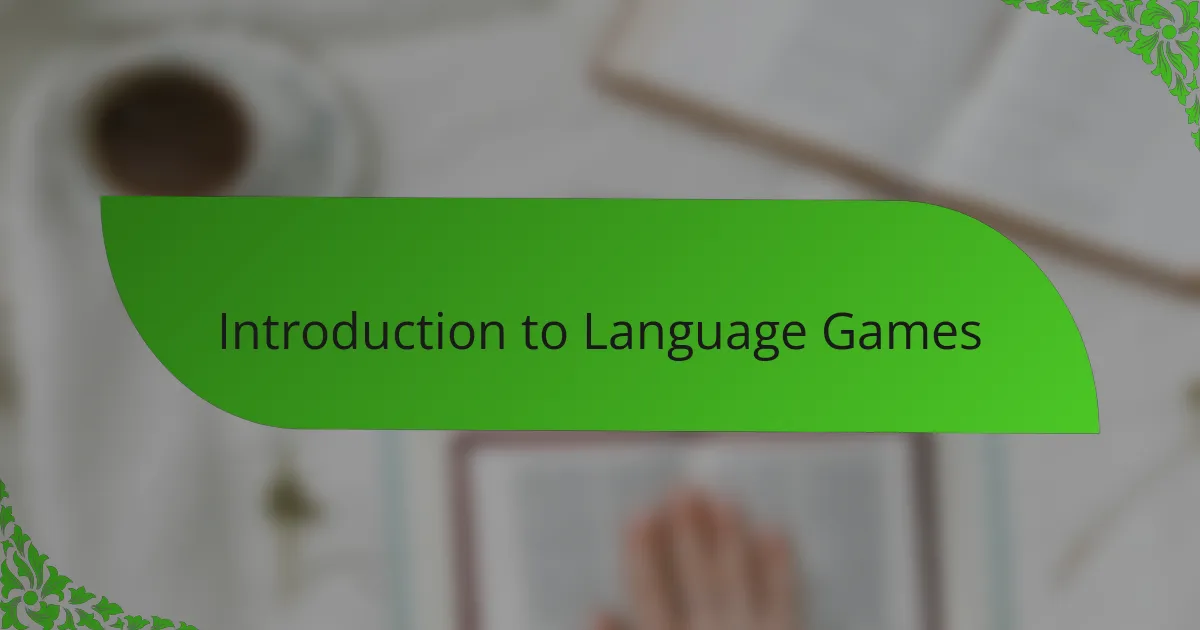
Introduction to Language Games
When I first encountered Wittgenstein’s concept of language games, I was intrigued by the idea that language is not just a system of rules but a form of life. Have you ever considered how the meaning of a word shifts depending on the context in which it’s used? That’s exactly what language games reveal—they show language as an activity embedded in everyday human interactions.
As I delved deeper, I began to see language as a series of interconnected practices, each with its own rules and purposes. It felt less like learning grammar and more like learning to play different games, each with unique goals and moves. This perspective helped me appreciate how flexible and dynamic communication truly is.
What struck me most was how these language games dissolve many philosophical puzzles about meaning and understanding. It made me rethink my assumptions about words and their functions. Could it be that by observing how we actually use language, we can better grasp its essence? Wittgenstein’s approach certainly opened that possibility for me.
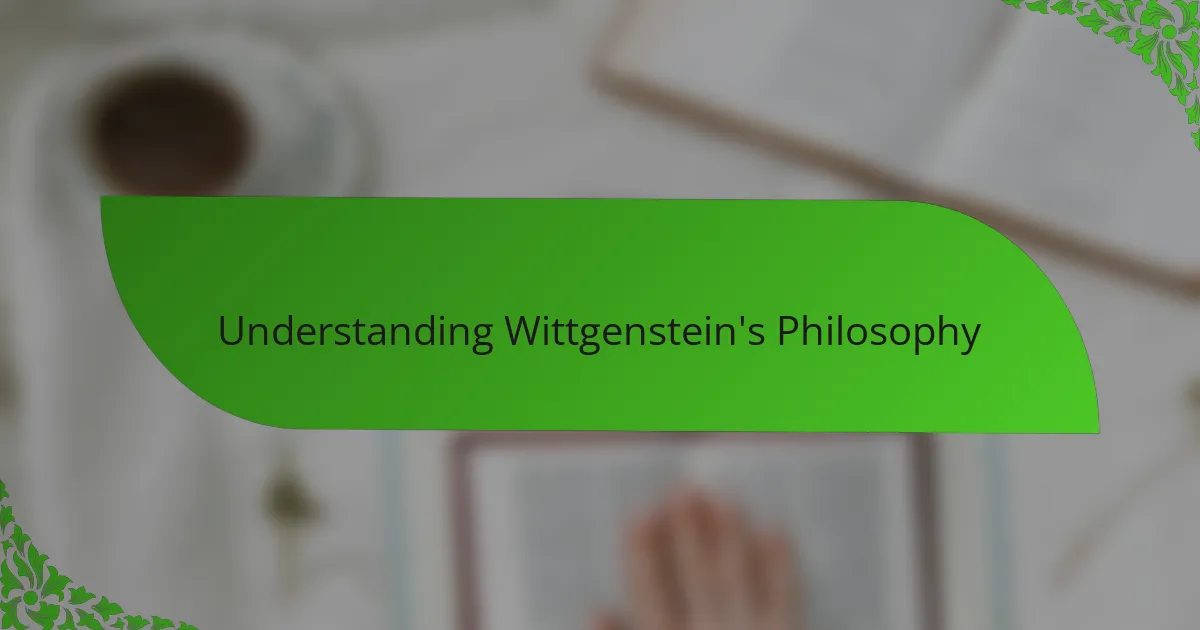
Understanding Wittgenstein’s Philosophy
Wittgenstein’s philosophy challenged everything I thought I knew about language. Instead of seeing words as fixed labels, he invited me to view them as tools that gain meaning through use. Isn’t it fascinating how this simple shift changes how we understand communication?
At times, grappling with his ideas felt like navigating a maze without a map. But gradually, I realized that Wittgenstein wasn’t giving me strict answers—he was teaching me to pay attention to how language lives and breathes in real interactions. This experiential learning was eye-opening.
What resonated deeply was his insistence that philosophical problems often arise from misunderstandings about language itself. Have you noticed how many debates hinge on unclear terms? For me, Wittgenstein’s insight turned language from a source of confusion into a key for clarity.
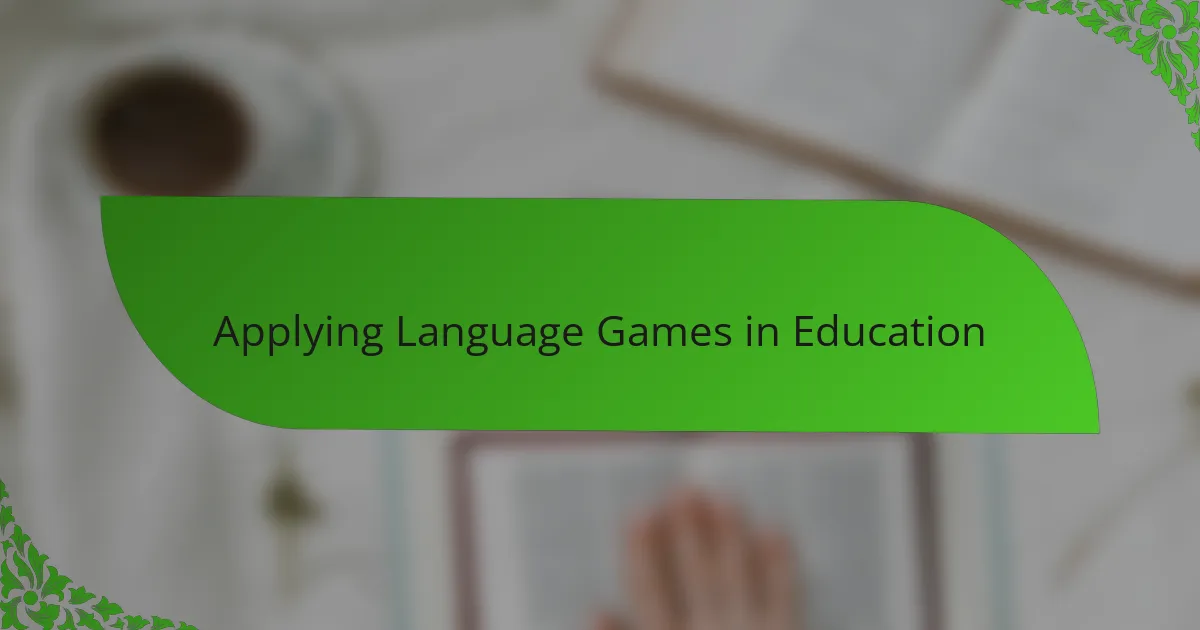
Applying Language Games in Education
Applying Wittgenstein’s language games in education transformed the way I approached teaching and learning. Instead of drilling definitions, I encouraged students to explore how words function in varied contexts—almost like playing new rounds of a game with shifting rules. Have you ever seen students light up when they realize that meaning isn’t fixed but flexible?
What amazed me was how this approach helped break down barriers between abstract ideas and real-life communication. When learners engaged in different “language games,” they didn’t just memorize concepts; they lived them. I remember a moment in class when a simple role-play clarified a philosophical term far better than any textbook explanation ever could.
This hands-on, playful method also fosters critical thinking and empathy. By stepping into different linguistic roles, students begin to appreciate multiple perspectives and the fluidity of meaning. Isn’t that what education should do—prepare us to navigate the complex language of life, not just pass exams?
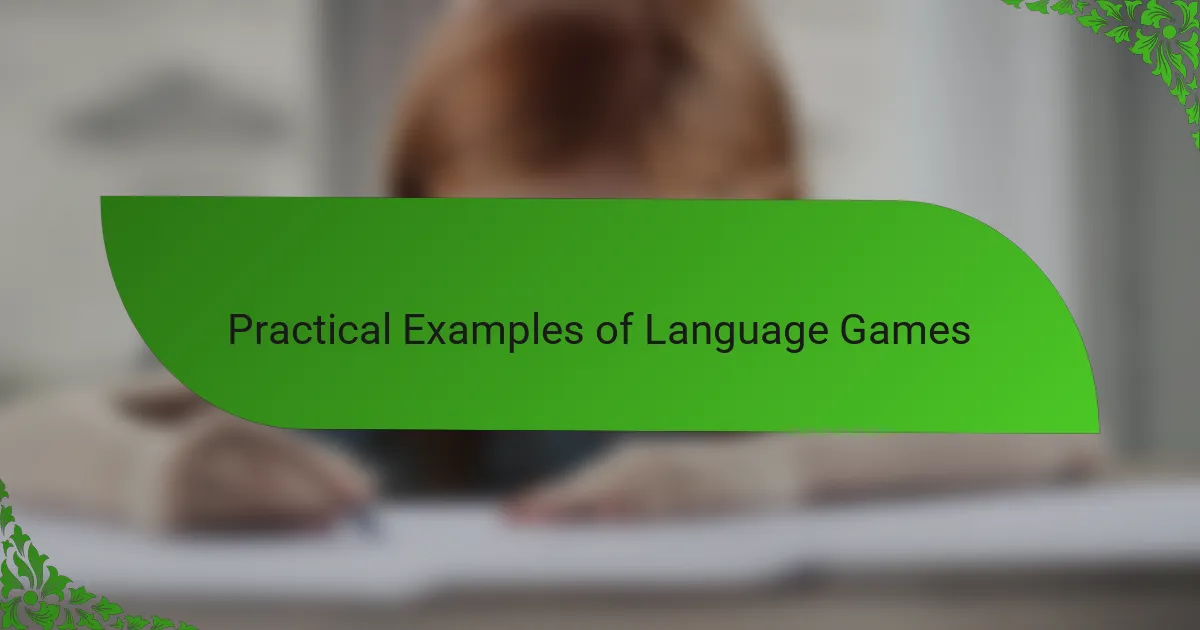
Practical Examples of Language Games
I recall once playing a language game with a group where we took turns giving instructions using only yes-or-no questions. It was remarkable to see how such simple constraints forced us to listen more carefully and think creatively about how meaning is shaped by context. Have you ever noticed how even a slight change in question format can shift an entire conversation’s flow?
In another example, I experimented with everyday greetings across cultures, noticing how the same phrase could carry warmth, politeness, or even distance depending on its use. This made me realize that language games are everywhere—from casual chats to formal speeches—and understanding their rules can reveal hidden social dynamics.
One striking moment was when teaching a philosophy class, I asked students to enact ordering in a café, emphasizing how the words and gestures form a game with shared but unspoken expectations. Watching them navigate this simple interaction taught us all a lot about how meaning isn’t just in words but in the activity surrounding them. Didn’t that bring Wittgenstein’s ideas vividly to life?
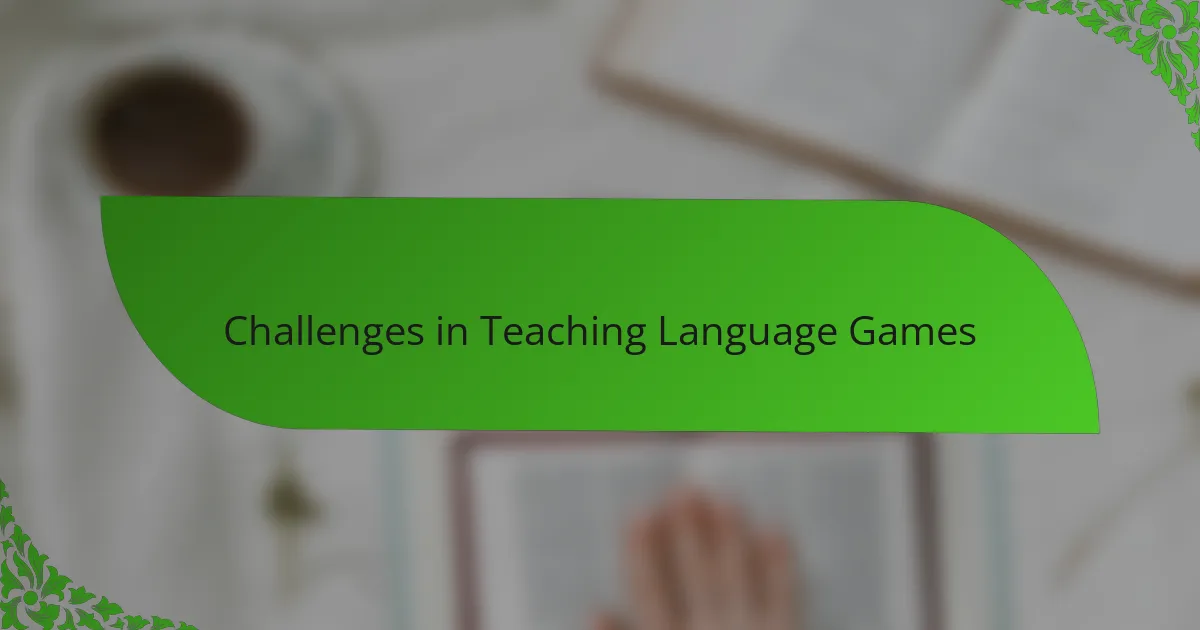
Challenges in Teaching Language Games
Teaching language games isn’t without its hurdles. I found that students often struggle with the idea that meaning isn’t fixed but fluid, which can be unsettling at first. How do you convince someone used to clear-cut definitions that words change like moves in a game? That shift in mindset takes patience and creative approaches.
Another challenge I’ve faced is the difficulty in creating authentic language game scenarios that resonate with learners’ real experiences. It’s tempting to fall back on abstract examples, but without context, the games lose their impact. I remember a class where a contrived role-play fell flat because students couldn’t relate—it was a clear reminder that relevance fuels engagement.
Finally, there’s the challenge of assessment. How do you measure understanding when the goal isn’t a single “right” answer but the ability to navigate multiple meanings? This open-endedness can feel disorienting both for students and educators. In my experience, balancing structure with flexibility requires ongoing reflection and adaptation. Have you ever felt like you’re grading someone’s creativity rather than their knowledge? That’s part of the complexity.
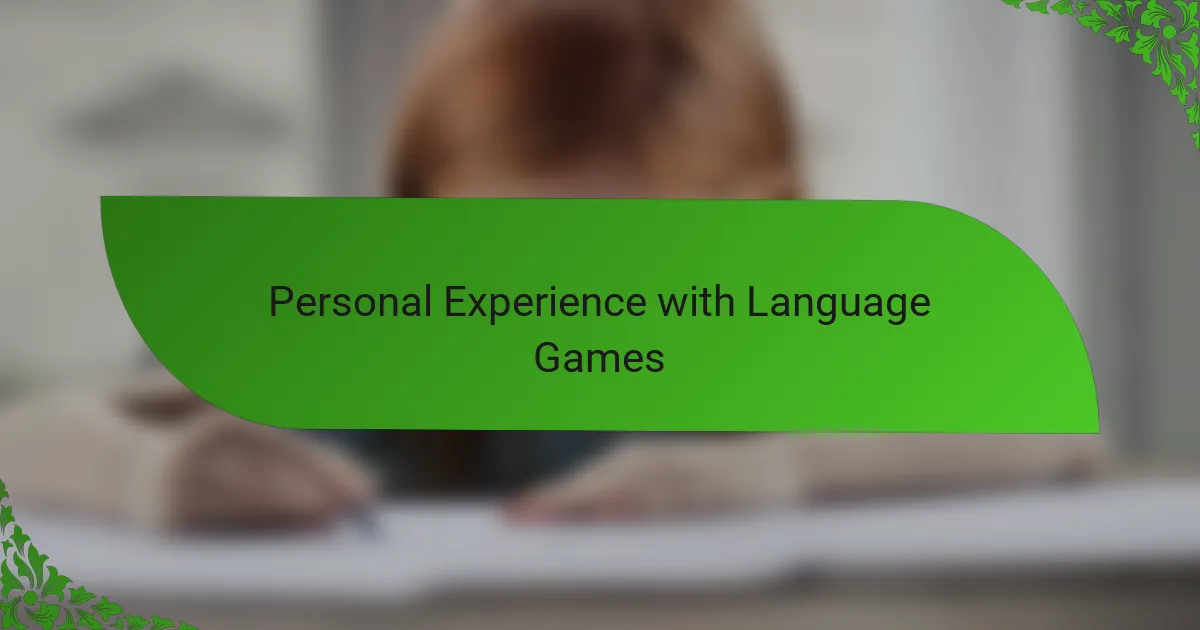
Personal Experience with Language Games
When I first tried to apply Wittgenstein’s language games in my own conversations, I was surprised by how much awareness it brought to everyday exchanges. Have you ever caught yourself adjusting your words because of who you’re talking to or where you are? That realization hit me hard—it’s like uncovering a hidden layer beneath our ordinary speech.
One memorable moment happened during a family dinner when I noticed how differently my words landed depending on which relative I was speaking to. It wasn’t just about what I said but how the “game” changed with each person, complete with its own unspoken rules. That experience made Wittgenstein’s theory feel less abstract and much more alive.
Sometimes, diving into these language games felt challenging—as if I were learning a dance with constantly shifting steps. But embracing that uncertainty led me to appreciate the richness of communication, where meaning flows rather than stays tethered. Don’t you think that kind of fluidity makes language endlessly fascinating? I certainly do.

Tips for Exploring Wittgenstein’s Ideas
One tip that really helped me explore Wittgenstein’s ideas was to stop looking for fixed definitions and instead pay close attention to how words move within different contexts. Have you tried pausing to notice how the same phrase changes meaning when spoken among friends versus in a formal setting? That simple shift opened a whole new way of understanding language as a living process.
It also helped to immerse myself in actual conversations and everyday situations as “language games.” I remember realizing that following the “rules” isn’t about memorizing grammar but about sensing the unspoken expectations. When I treated language this way, I felt less overwhelmed and more curious—like I was discovering playful puzzles rather than solving rigid problems.
Lastly, I found it crucial to be patient and gentle with myself. Wittgenstein’s ideas can be puzzling because they invite us to think differently about something as familiar as language. Instead of rushing to conclusions, I gave myself space to experience uncertainty, which turned out to be the richest place for learning. Have you ever noticed how slowing down sometimes reveals details you missed at first glance? That’s where the magic of language games truly lives.